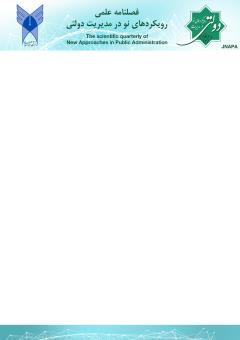Analyzing the Dimensions and Components of Teachers' Professional Growth Management Model
Subject Areas : Public administrationJabar Rezaei 1 , Sepideh Jafari 2 , FARANAK OMIDIAN 3
1 - PhD student, Department of Educational Management, Ahvaz Branch, Islamic Azad University, Ahvaz, Iran.
2 - Assistant Professor, Educational Management Department, Ahvaz Branch, Islamic Azad University, Ahvaz, Iran
3 - education , islamic azad university , dezful , iran
Keywords: Professional Growth, Teachers, Hybrid Approach ,
Abstract :
Analyzing the Dimensions and Components
Of
Teachers' Professional Growth Management Model
Jabbar Rezaei
PhD student, Department of Educational Management, Ahvaz Branch, Islamic Azad University, Ahvaz, Iran.
Sepideh Jafari
Assistant Professor, Department of Educational Management, Dezful Branch, Islamic Azad University, Dezful, Iran
jafari@vatanmail.ir
Frank Omidian
Assistant Professor, Department of Educational Management, Dezful Branch, Islamic Azad University, Dezful, Iran
ORCID: 0000-0002-0513-7095
Received: 06 September 2024 | Revised: 16 November 2024 | Accepted: 28 November 2024
Extended Abstract
The main goal of this research was to analyze the dimensions and components of the teachers' professional growth management model. The current research was placed in the qualitative research group in terms of its practical purpose and in terms of the nature of the data and analysis style، and it was a meta-composite method.
The data collection method in this research is based on documentary information. The research data were collected and analyzed using meta-composite method in order to collect data related to the research that all the studies have been done in the field of teachers,' professional
growth and then extract and identify the components affecting it in these studies using the seven-step method of Sandolski and Barroso (2007) was used.
The findings of the research showed that for the professional growth of teachers, attention should be paid to at least ۸ basic dimensions. These dimensions are: teaching, training, facilities, evaluation, content, technology, expertise, in-service course.
In addition، the components and needs related to each of these factors have been examined, which have been extracted in the form of educational needs and non-educational needs. Based on the results, it can be said that the growth of teachers has different dimensions, so the planners of the education system can pay attention to these dimensions and act in order to increase and better manage the growth of teachers.
The research findings showed that for the professional development of teachers, at least 8 basic dimensions should be considered. These dimensions are: teaching, training, facilities, evaluation, content, technology, expertise, and in-service period. In addition, the components and needs related to each of these factors have been examined and extracted in the form of educational needs and non-educational needs.
Among the limitations of this research, it can be noted that in terms of method, it was only done with meta-synthesis and the results of this research were based on the validity of previous studies. Also, the number of articles with conditions was small, which means that there is a research gap in this field. Therefore, it is suggested that researchers use integrated methods in the future. It is also suggested that the Ministry of Education form a working group to explain and prioritize the different dimensions of teachers' professional development and its management.
Keywords: Professional Growth, Teachers, Hybrid Approach
Contribution of authors
All authors have participated in this research in equal proportion.
Ethical approval
Written informed consent was obtained from the individuals for their anonym zed information to be published in this article.
Conflict of interest
No conflicts of interest are declared by the authors.
یوسفی روشن، محمدرضا، و لرستانی، قاسم. (۱۳۸۴). طراحی ساختار نظام مستندسازی تجربیات سازمانی مدیران. مدرس علوم انساني، 9(42)، 23-42. https://www.sid.ir/paper/424987/fa
پورگلوی، محمد جواد. (۱۳۹۸). اهمیت و تاثیر استفاده از تجارب معلمان با سابقه در فرایند یاددهی یادگیری و تدریس اثر بخش. در دومین کنفرانس بین المللی روانشناسی،مشاوره و علوم تربیتی. https://civilica.com/doc/1041238/
Clark, R. C., & Mayer, R. E. (2016). e-Learning and the Science of Instruction: Proven Guidelines for Consumers and Designers of Multimedia Learning. John Wiley & Sons.
Clements, D. H., & Sarama, J. (2018). Learning and Teaching Early Math: The Learning Trajectories Approach (2nd ed.). Routledge.
Cochran-Smith, M., & Lytle, S. L. (2018). Inquiry as Stance: Practitioner Research for the Next Generation. Teachers College Press.
Hattie, J., & Yates, G. C. R. (2019). Visible Learning and the Science of How We Learn. Routledge.
Hiebert, J., & Morris, A. K. (2018). Teaching Mathematics for Understanding: An Analysis of Lessons Submitted by Teachers Seeking National Board Certification. The Elementary School Journal, 118(1), 1-22.
Hiebert, J., Morris, A. K., Berk, D., & Jansen, A. (2007). Preparing teachers to learn from teaching. Journal of Teacher Education, 58(1), 47-61.
Marzano, R. J., Pickering, D. J., & Heflebower, T. (2021). A Handbook for High Reliability Schools: The Next Step in School Reform. Marzano Resources.
McTighe, J., & Wiggins, G. (2013). Essential Questions: Opening Doors to Student Understanding. ASCD. Mishra, P., & Koehler, M. J. (2019). Too Cool for School? No Way! Learning and Leading with Technology, 38(7), 10-14.
Mishra, P., & Koehler, M. J. (2020). Technological pedagogical content knowledge: A framework for teacher knowledge. Teachers College Record, 108(6), 1017-1054.
National Council of Teachers of Mathematics. (2010). Principles to Actions: Ensuring Mathematical Success for All. Reston, VA: NCTM.
Noddings, N. (2018). Philosophy of Education. Routledge.
Osterman, K. F., & Kottkamp, R. B. (2004). Reflective practice for educators: Professional development to improve student learning. Corwin Press.
Pellegrino, J. W., Chudowsky, N., & Glaser, R. (2018). Knowing What Students Know: The Science and Design of Educational Assessment. National Academies Press.
Polya, G. (2018). How to Solve It: A New Aspect of Mathematical Method (2nd ed.). Princeton University Press.
Puentedura, R. R. (2019). SAMR: A contextualized introduction. In Education technology, change, and theory (pp. 33-48). Springer.
Ryan, R. M., & Deci, E. L. (2019). Self-Determination Theory: Basic Psychological Needs in Motivation, Development, and Wellness. Guilford Press.
Smith, P. L., & Ragan, T. J. (2019). Instructional Design. John Wiley & Sons.
Tomlinson, C. A. (2017). How to Differentiate Instruction in Academically Diverse Classrooms. ASCD.


